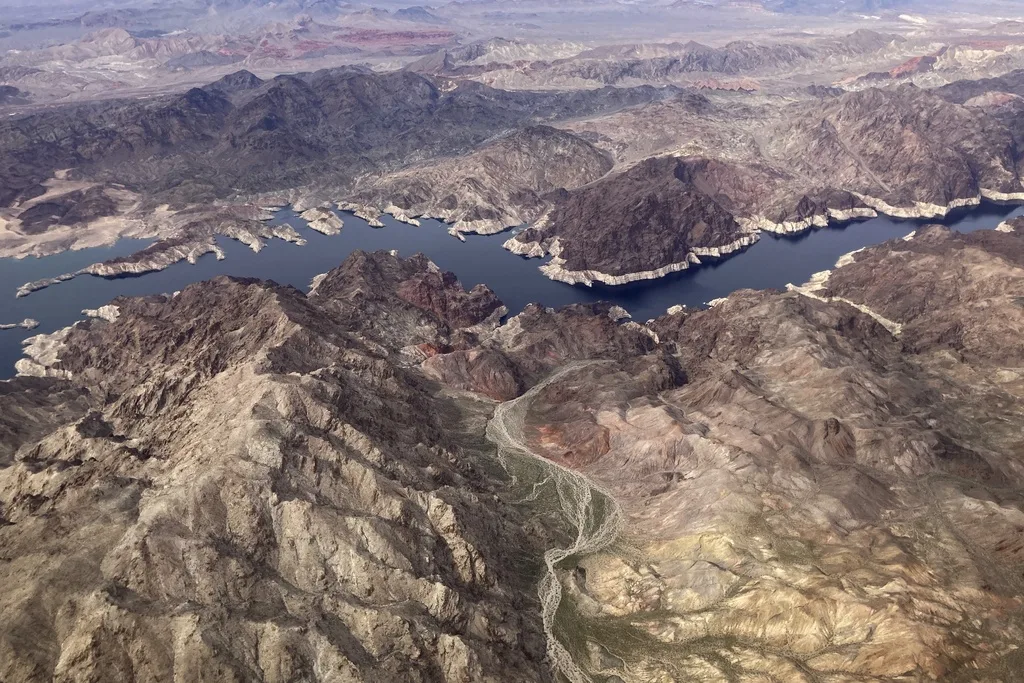
FILE - A bathtub ring shows where the water mark on Lake Mead once was along the boarder of Nevada and Arizona, March 6, 2023, near Boulder City, Nev. Nearly half of the U.S. West has emerged from drought, but intense water challenges persist, scientists said Tuesday, May 9. (AP Photo/John Locher, File)
Lawmakers say the bipartisan bill would give the US Army Corps of Engineers tools needed to respond to drought conditions in the West and better manage water resources.
A bipartisan group of congressional lawmakers introduced a bill last week that seeks to provide the US Army Corps of Engineers increased funding and authority to help combat long-term drought conditions in the West.
The Drought Resilient Infrastructure Act would direct the Army Corps to prioritize water conservation or storage efforts at Corps facilities over other missions such as flood control or combating invasive species during times of drought. But the bill would also provide the Corps with new infrastructure programs to help states, counties, tribes, and other locales to construct projects to mitigate drought conditions.
The bill was introduced Thursday by Arizona Democratic US Rep. Greg Stanton and co-sponsored by Nevada Reps. Susie Lee and Dina Titus, both Democrats. A nearly identical version of the bill was introduced in the Senate by lawmakers from Arizona, California, and Nevada.
“Southern Nevada continues to deal with the effects of our worst drought in centuries, and we need bold solutions to protect our precious water, natural resources, and the hardworking families who depend on them,” Lee said in a statement. “Our bipartisan legislation will make sure the Army Corps of Engineers is using all of their tools and resources to combat drought, upgrade our infrastructure and boost water conservation efforts.”
MORE: Nevada to get $9M in federal grants for water projects
The Army Corps operates more than 700 dams, 900 harbors, and 12,000 miles of inland waterways, according to Lee’s office. Among other responsibilities, the Corps stores emergency supplies of drinking water, manages navigable waterways, and funds drought mitigation projects.
“As Nevada and the West confront historic drought, we must implement innovative solutions to conserve water,” Sen. Jacky Rosen (D-Nevada) said in a press release announcing the bill.
But Lee’s office says under current law, the Corps lacks the authority to modify operations at its own facilities. The new legislation would give the Corps new authorities to cut through red tape relating to its own water conservation, drought resilience, and emergency drought operations.
Despite recent winters with increased snowpack, the US Drought Monitor estimates more than half of the western US is currently impacted by drought conditions. Areas within Arizona, California, Colorado, Idaho, Montana, Nevada, New Mexico, Oregon, Utah, Washington, and Wyoming are all considered to be facing drought.
The drought has been especially burdensome for states like Nevada, Arizona and California — which are among a contingent of states that source drinking water from the Colorado River. Those three states reached a deal with the federal government last year to reduce their allotted share of Colorado River Water by 3 million-acre-feet through 2026 as states along the river continue to negotiate reforms to the 1922 agreement dictating how the river’s water is shared.
“With Arizona facing an unprecedented drought, proper infrastructure and water management systems are crucial,” Rep. Juan Ciscomani (R-Arizona) said in a statement. “This bipartisan effort provides the Army Corps of Engineers with the needed resources to mitigate the effects of the drought, further prioritize water conservation efforts, and upgrade existing infrastructure to better serve our communities.”

Condena Chispa Nevada el retiro de apoyo en su pago de electricidad a familias de bajos ingresos
Chispa Nevada condena que la administración Trump retire ilegalmente el financiamiento del programa de Nevada para reducir las facturas de...

Biden admin moves to shield Nevada public lands from mining with support of tribes, local leaders
In one of President Biden’s last moves in office, his administration has moved to protect 269,000 acres of public land in Nevada from a proposed...

Many fear help for Nevada water conservation will dry up under Trump
Despite billions from the Inflation Reduction Act going to benefit Nevada, President-elect Donald Trump and conservative fiscal hawks may pursue a...

Grant from Biden infrastructure law to help install 185 EV charges around Las Vegas valley
A $3.2 million grant from the US Department of Transportation will help fund and install electric vehicle charging stations in primarily...

Almost 500 people have died from extreme heat in Las Vegas in 2024, officials say
Factors relating to extreme heat accounted for 491 deaths and more than 3,500 emergency room visits, according to Clark County officials, as Las...

Nevada gold mining venture selected for $95M solar project
After being awarded a federal grant to help decarbonize the mining industry, Nevada Gold Mines hopes to build two on-site solar panel and battery...





